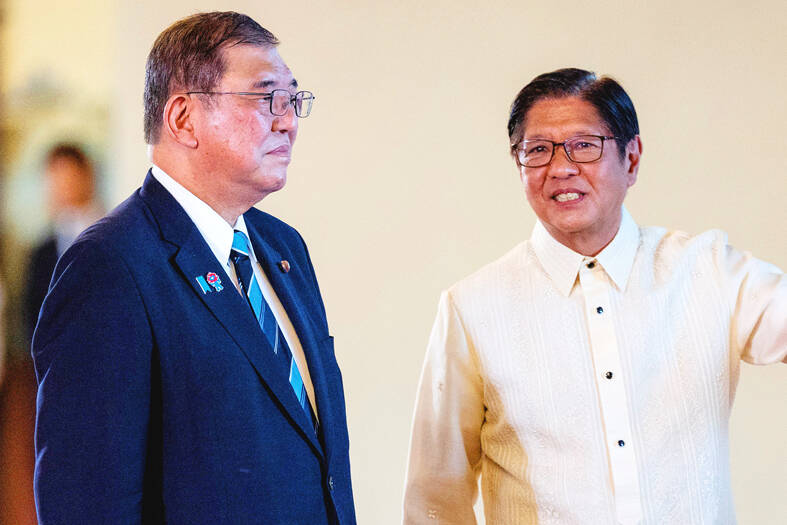Japanese Prime Minister Shigeru Ishiba yesterday held talks with Philippine President Ferdinand Marcos Jr, in a move to advance security and economic ties between two of Washington’s closest Asian allies amid rising Indo-Pacific tensions.
Ishiba’s visit to the Philippines comes at a crucial time, with both nations confronting growing concerns over regional security and China’s assertiveness in the South China Sea, while navigating global trade tensions sparked by sweeping US tariffs, and increased friction between the US and China.
Ishiba said he discussed with Marcos the far-reaching impact of US-China trade tensions on the global economy and multilateral free-trade frameworks. He assured Marcos he would heed the concerns of Japanese companies operating in the Philippines to find solutions.

Photo: Reuters
The two leaders also explored ways to further defense and economic ties, with talks centered on Japan’s official security assistance program, of which the Philippines was among the first beneficiaries.
Ishiba said that Japan and the Philippines had started talks on a potential information security agreement, which would enable exchanges of confidential information and boost security cooperation.
Japan and the Philippines last year signed the Reciprocal Access Agreement, the first of its kind Japan has signed in Asia, that would allow deployment of forces on each other’s soil.
While the Philippines has ratified the pact, it still awaits legislative approval in Japan. Once in place, it would ease the entry of equipment and troops for combat training and disaster response.
Ishiba and Marcos also commited to promoting a free and open Indo-Pacific, and upholding a rules-based international order.
“I hope that our two nations will continue to closely communicate with each other to oppose attempts to change the status quo in the East and South China seas by force or coercion,” Ishiba said at a joint news conference with Marcos.

Taiwan yesterday denied Chinese allegations that its military was behind a cyberattack on a technology company in Guangzhou, after city authorities issued warrants for 20 suspects. The Guangzhou Municipal Public Security Bureau earlier yesterday issued warrants for 20 people it identified as members of the Information, Communications and Electronic Force Command (ICEFCOM). The bureau alleged they were behind a May 20 cyberattack targeting the backend system of a self-service facility at the company. “ICEFCOM, under Taiwan’s ruling Democratic Progressive Party, directed the illegal attack,” the warrant says. The bureau placed a bounty of 10,000 yuan (US$1,392) on each of the 20 people named in

The High Court yesterday found a New Taipei City woman guilty of charges related to helping Beijing secure surrender agreements from military service members. Lee Huei-hsin (李慧馨) was sentenced to six years and eight months in prison for breaching the National Security Act (國家安全法), making illegal compacts with government employees and bribery, the court said. The verdict is final. Lee, the manager of a temple in the city’s Lujhou District (蘆洲), was accused of arranging for eight service members to make surrender pledges to the Chinese People’s Liberation Army in exchange for money, the court said. The pledges, which required them to provide identification

Nine retired generals from Taiwan, Japan and the US have been invited to participate in a tabletop exercise hosted by the Taipei School of Economics and Political Science Foundation tomorrow and Wednesday that simulates a potential Chinese invasion of Taiwan in 2030, the foundation said yesterday. The five retired Taiwanese generals would include retired admiral Lee Hsi-min (李喜明), joined by retired US Navy admiral Michael Mullen and former chief of staff of the Japan Self-Defense Forces general Shigeru Iwasaki, it said. The simulation aims to offer strategic insights into regional security and peace in the Taiwan Strait, it added. Foundation chair Huang Huang-hsiung

’DISTORTION’: Beijing’s assertion that the US agreed with its position on Taiwan is a recurring tactic it uses to falsely reinforce its sovereignty claims, MOFA said The Ministry of Foreign Affairs (MOFA) yesterday said Chinese state media deliberately distorted Taiwan’s sovereign status, following reports that US President Donald Trump agreed to uphold the “one China” policy in a phone call with Chinese President Xi Jinping (習近平). During the more than one-hour-long call, Xi urged Trump to retreat from trade measures that roiled the global economy and cautioned him against threatening steps on Taiwan, a Chinese government summary of the call said. China’s official Xinhua news agency quoted Xi as saying that the US should handle the Taiwan issue cautiously and avoid the two countries being drawn into dangerous